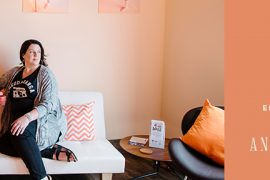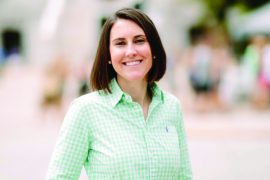By Katy Macek
After graduating from the University of Wisconsin–Madison in 2002, and securing a job with the university, Sarah Stilp decided she would never return to school. Working in UW’s Division of Continuing Studies, she’s been with the university for nearly 20 years and was happy with her career.
Like many of us though, the pandemic changed her outlook. In February 2021, Stilp decided to enroll in a two-year online master’s program in organizational leadership from Colorado State University’s Global Campus.
“There was a lot happening around me — layoffs, job insecurity — and it was a different lens to see my career path through. I felt a little bit unprepared for what might lie ahead,” she says. “The work-life balance was a little bit different, and [earning a master’s degree] felt more doable than it ever had before.”
Stilp calls this concept the “pandemic revelation,” and she’s not alone in her perspective shift.
Most colleges don’t have hard data on COVID-19’s impact on continuing education, but every source BRAVA spoke to had observations and stories to tell about students who were influenced by the pandemic to return to campus — in person or virtually.
CHANGING INTERESTS
Melissa Sanchez Cruz manages Madison Area Technical College’s WorkSmart Network, a program funded through the Workforce Development Board and adults who are unemployed, laid off or rethinking their career paths. It provides guidance on college resources and career planning, among other areas of expertise.
She says most adult students don’t share their reasons for going back to school, so it’s hard to pinpoint the pandemic’s influence. This year, however, she’s seen an influx of those laid off from professional-level jobs, rather than from manufacturing or retail industries. Many of those are looking to gain technical skills in healthcare or finance.
“Some of these women are taking the pandemic and resulting layoffs as an opportunity to make this change,” she says. “If they wouldn’t have been laid off this year, nothing would have prompted them to come back.”
Annie Lewis quit her corporate leadership role at Walgreens as a beauty expert in early March 2020, right before the pandemic hit full force. She had plans of pursuing a full-time career as an aesthetician. Suddenly though, she found herself without work in the middle of a pandemic.
“I was sitting at home panicking,” Lewis says. “The pandemic was the driving force for me to finish my degree.”
Lewis originally began her degree at UW-Whitewater, but was diagnosed with type 1 diabetes, and she says the diagnosis forced her to “relearn everything about my body and how to take care of myself.” Unable to balance the workload, she left college, opting instead to work her way up into a leadership position in beauty retail. But, the corporate world wasn’t for her.
Although she wasn’t planning to return to school, the pandemic made her rethink things. Because she needs to improve her GPA before re-enrolling, she entered UW–Madison’s Badger Ready program that prepares adult students who want to transfer but aren’t currently eligible. She hopes to eventually attend UW–Madison to obtain her counseling degree and combine that with her aesthetician license to help women like her, with autoimmune and eating disorders, achieve peak wellbeing.
WHERE TO START
Moira Kelley, a career and education counselor for UW’s Division of Continuing Studies, says her office often works with returning adult students looking to continue their schooling — or have no idea what they want to do next, but know they need a change.
“If you’re not sure where to turn next, don’t hesitate to touch base with our office,” she says. “You don’t have to go it alone.”
Kelley’s No. 1 piece of advice when considering whether to pursue continuing education is to ask lots of questions. Particularly, “who else can I talk to?”
UW’s Division of Continuing Studies and Madison College’s WorkSmart offer resources that allow people to work with advisers and better understand their options, which will allow the individual to surmise if returning to school is a good fit. UW–Madison’s Adult Career and Special Student Services (acsss.wisc.edu) also has great resources for career planning.
Betsy Kacizak, director of admissions for the UW School of Business, says her team also does consultation appointments with people interested in the MBA program to see if it’s the right fit.
Fortunately, there are more options than ever. This fall, Kelley says UW-Madison will offer five online undergraduate degree programs, all in the business realm. They also have several master’s and certificate programs designed for working adults.
Sanchez Cruz says up to 70% of Madison College’s courses were online or hybrid throughout the past year. Though that may revert after the pandemic, she expects online classes to continue in an increased capacity.
There are countless online, nonlocal options as well. Stilp discovered her online master’s program through tons of research. She suggests narrowing down priorities (class format, number of years, cost, et cetera) and “just start Google searching.”
“It might take a little legwork up front, but it’s worth it [if you] put in the time,” Stilp says.
IMPORTANT CONSIDERATIONS
Moira Kelley of Madison College and Betsey Kacizak of UW–Madison suggest considering the following when exploring continuing education:
» Career Goals. Is more schooling necessary, or would some other type of training be more adequate (and less expensive)?
» Accreditation. Verify it’s an accredited school or program, so you’re not wasting money.
» Program Format. What type of program — whether it’s in person, online or hybrid — would best fit your learning style and your current life situation?




